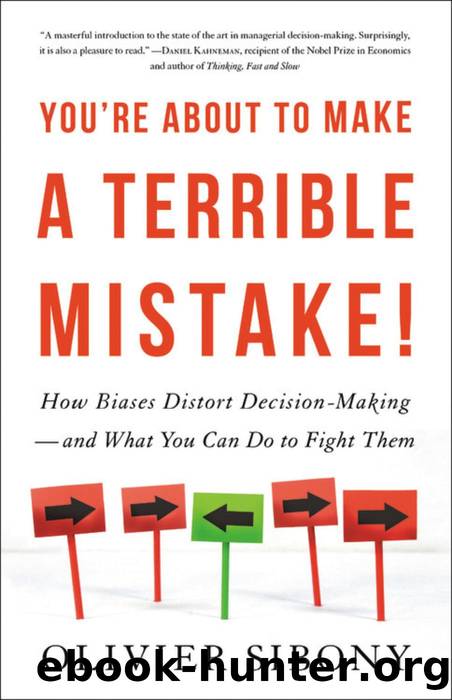You're About to Make a Terrible Mistake by Olivier Sibony

Author:Olivier Sibony
Language: eng
Format: epub
Publisher: Little, Brown and Company
Published: 2020-07-14T00:00:00+00:00
Can You Really Become Aware of Your Biases?
The first problem, to use the biblical parable, is that we can easily see the speck of other people’s biases, but we don’t see the beam of our own. We simply aren’t aware of them.
This is the key difference between a bias and a simple mistake. We all know what a mistake is; we are usually able to recognize when we’ve made a mistake and avoid making the same one twice. But we are almost never aware of bias in ourselves: on the contrary, we feel unchallenged, comfortable, confident in our reasoning. For instance, when we give in to confirmation bias, we’re not aware that we’re favoring data that justifies our hypothesis instead of looking for evidence that would contradict it. Our entire mind is mobilized to find evidence that will, in fact, confirm our preexisting viewpoints. How can we possibly learn to overcome an obstacle if we are never aware that it is in our way?
Overconfidence (an easy bias to measure) provides a striking illustration of this problem. Remember the experiment in which about 90 percent of people interviewed thought they were among the top 50 percent of drivers? If you ever have the chance, try this experiment yourself in front of an audience—any group of more than a dozen adults will do. When the audience members raise their hands, everyone can see that the group is collectively overestimating itself: the percentage of people who think they are above the median is well over 50 percent. Wait a moment to let the embarrassed laughter dissipate, and then ask this simple question: “Who in this room has changed their mind about their own driving abilities during the last few minutes? Do any of you now think you’re a less good driver than you thought when entering this room?” Almost no one will say yes! Everyone can see the collective mistake, but no one draws any individual conclusions. Sure, someone must be overestimating themselves, but it’s not me, it’s them!
If this kind of statistical feedback is not sufficient to eliminate bias, what about stronger, more personal, loud and clear feedback? One study considered groups of drivers who not only had poor driving records but also had been hospitalized after car accidents caused, in most cases, by their own negligence. The researchers found that members of this group were just as overconfident as the members of a control group of drivers with good driving records. Most of the drivers whose poor driving skills landed them in the hospital, some of whom were still hospitalized at the time they were interviewed, believed they drove better than average, too!
As these examples show, reminders to “pay attention to our biases” cannot be expected to produce real results. Even when we’re intellectually aware of the existence of biases in general, we underestimate their effect on us in particular. This is called the bias blind spot. As Kahneman observes, “We can be blind to the obvious, and we are also blind to our blindness.
Download
This site does not store any files on its server. We only index and link to content provided by other sites. Please contact the content providers to delete copyright contents if any and email us, we'll remove relevant links or contents immediately.
Hit Refresh by Satya Nadella(9138)
The Compound Effect by Darren Hardy(8969)
Change Your Questions, Change Your Life by Marilee Adams(7783)
Nudge - Improving Decisions about Health, Wealth, and Happiness by Thaler Sunstein(7709)
The Black Swan by Nassim Nicholas Taleb(7130)
Deep Work by Cal Newport(7085)
Rich Dad Poor Dad by Robert T. Kiyosaki(6633)
Daring Greatly by Brene Brown(6514)
Principles: Life and Work by Ray Dalio(6449)
Playing to Win_ How Strategy Really Works by A.G. Lafley & Roger L. Martin(6309)
Man-made Catastrophes and Risk Information Concealment by Dmitry Chernov & Didier Sornette(6019)
Big Magic: Creative Living Beyond Fear by Elizabeth Gilbert(5774)
Digital Minimalism by Cal Newport;(5765)
The Myth of the Strong Leader by Archie Brown(5509)
The Slight Edge by Jeff Olson(5418)
Discipline Equals Freedom by Jocko Willink(5390)
The Motivation Myth by Jeff Haden(5213)
The Laws of Human Nature by Robert Greene(5208)
Stone's Rules by Roger Stone(5088)
